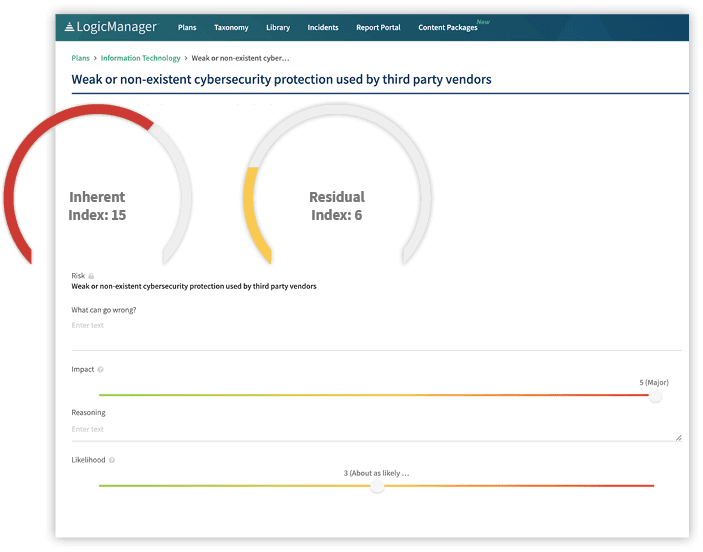Due Diligence Questionnaires Response
Deliver Comprehensive DDQ Answers with Efficiency and Protect Your Reputation
LogicManager’s Due Diligence Questionnaire (DDQ) Response software empowers organizations to manage customer information requests with greater efficiency and accuracy. Our risk-based approach ensures that requests to customer questionnaires are handled in order of criticality. Adopting this approach will ensure that members of your organization responsible for handling these requests are allocating resources in an optimized fashion.
- Leverage a centralized repository to collect and store necessary evidence to respond to customer requests for due diligence questionnaires
- Use reporting and dashboards to track information requests and turnaround times
- Our Integration Hub allows for seamless integration with over 500 popular third-party applications such as WorkDay, DocuSign, Office365, BitSight, RiskRecon, and accounts payable systems to more easily handle due diligence questionnaires in any format

Why Logicmanager? – Users of LogicManager’s ERM software explain how their IT GOV programs have benefited from our platform and expert advisory service.
“The Customer Service we get from LogicManager is second to none. Our account representative manages many priorities for my team and other companies. He is genuine, honest, responsive, and very pleasant to work alongside.”
The LogicManager DifferenceA Holistic Approach to Due Diligence Questionnaires

Business Decision InsightsFocus on What’s Important
Through our ERM software, we enable our customers to allocate more time to strategic risk management, reducing their involvement in tedious administrative activities like data cleansing and manipulation. Our solution enhances operational efficiency while uncovering the “unknown knowns” that risk managers may overlook, thus ensuring proactive identification and mitigation of risks.
Customer ExperienceStreamline Your Risk Management Program
Unlike other software that requires IT professional customization, our solution allows customers to control engagement through an end-user configuration. This approach enables faster time-to-value and allows organizations to evolve their programs over time, not to mention a quicker return on investment.


Risk-Based ApproachPrepare for Tomorrow’s Surprises Today
A risk-based approach is the key to effective governance, risk, and compliance. By adopting this methodology, organizations can prioritize their efforts across different departments, recognize potential hurdles and crucial interdependencies, and allocate resources appropriately. Embracing a risk-based mindset allows organizations to strategically allocate their resources to areas that hold the most value in terms of privacy protection and compliance.
CapabilitiesAn All-In-One Due Diligence Questionnaire Platform
Frequently Asked QuestionsFoundations of Due Diligence Questionnaire Response
Related PackagesYou May Also Like…
Request a DemoLearn How LogicManager’s DDQ Response Software Can Protect Your Reputation
Speak with one of our risk specialists today and discover how you can empower your organization to uphold their reputation, anticipate what’s ahead, and improve business performance through strong governance.




